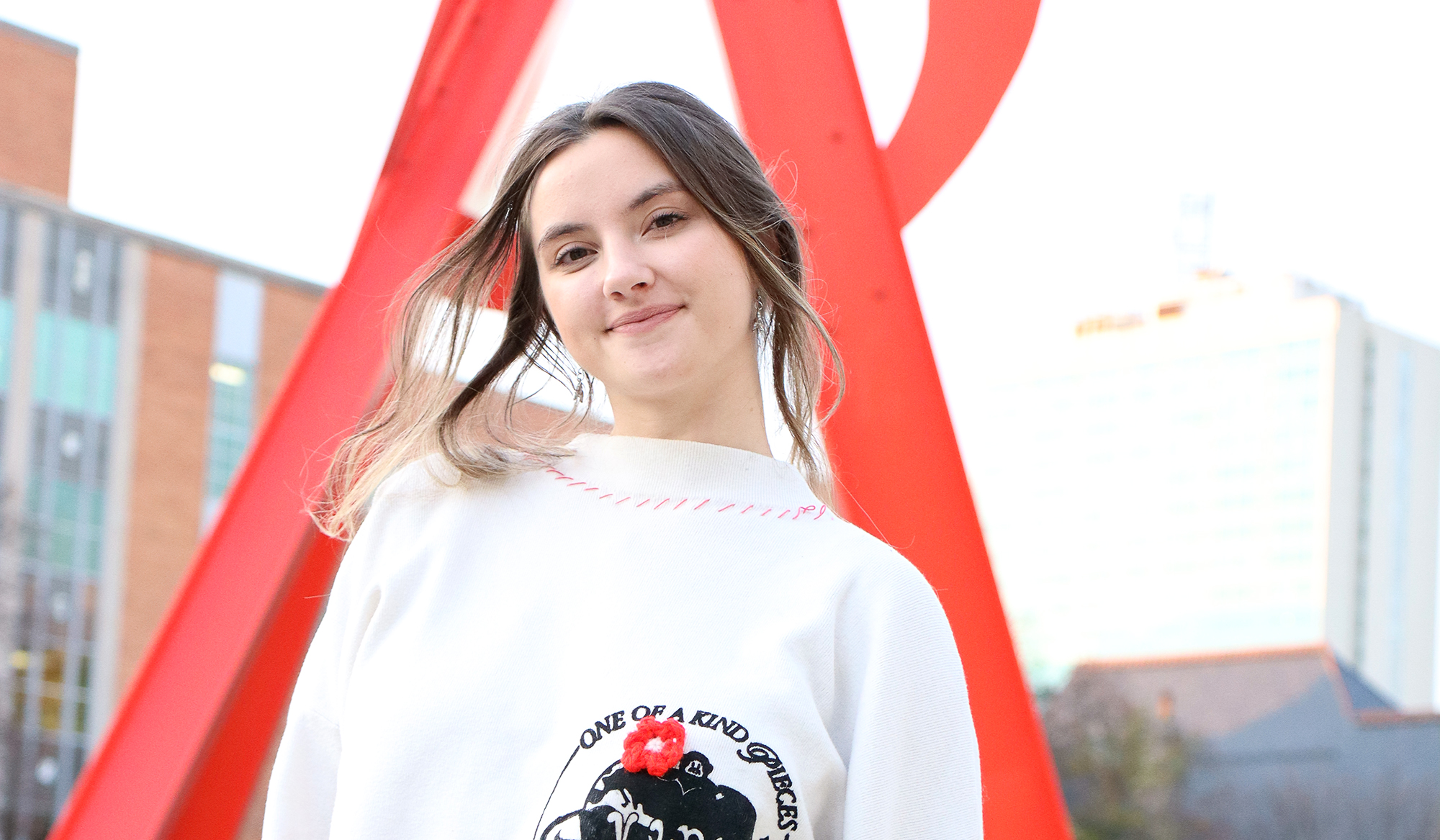Two U-M alumnae—an adoptive mother and her attorney—are involved in a U.S. Supreme Court case that could change same-sex marriage laws in this country.
The outside of the white, two-story house is neat as a pin, sitting among other middle-class homes on a mature street in Hazel Park, Michigan. The sunny, quiet mid-morning in late February underscores the serenity of the neighborhood. So when you walk in the door of the house, you’re unprepared for the almost-visible energy that emanates from within.
One child bounces in an activity saucer, babbling as she stares up at you with big brown eyes. Another runs around, trying to expend the excess energy typical of a toddler. A third approaches and strikes up a conversation as if you’re old friends. Meanwhile, the dog jumps and sniffs around, trying to claim his share of attention while “Dora the Explorer” provides background noise. The scene is typical of any household with four children ranging in age from 2. to 6, one infant foster child, and two working parents.
What isn’t typical is that these particular parents stand at the threshold of history.
Jayne Rowse, ’14, and her partner, April DeBoer, are two parties in a case that could change the legal landscape for same-sex marriage in the United States. What started as an attempt to develop legal documents to protect their children has become a case before the U.S. Supreme Court, which will decide this summer whether gay marriage should be legal in this country.
The Court consolidated cases from four different states, says Dana Nessel, ’90, one of the attorneys handling the case, and will decide two different questions. The first question, involving Rowse and DeBoer’s case along with a case from Kentucky, asks whether the Equal Protection Clause of the 14th Amendment requires a state to license a same-sex marriage. The second, involving cases from Ohio and Tennessee, asks whether the 14th amendment requires a state to recognize a same-sex marriage performed in another state. While several states currently recognize same-sex marriage, others—including Michigan—have bans in place that restrict it.
“If we are successful on our case, then hopefully that will be the precedent and it will strike down the bans in all the remaining states in the nation,” says Nessel.
The Court heard oral arguments on April 28 and is expected to issue its opinion in June.
“We decided that it was something that had to be done, and we had the opportunity to do it.”
ROWSE MET DEBOER THROUGH A MUTUAL FRIEND in 1999, and they dated on and off until 2005. During that time, both were more focused on their education than on starting a family.
They eventually moved in together and started planning their family, first considering adoption in 2006. Because Michigan law allows adoption only by married couples or single people, they worked with an agency in California that allowed both women to adopt a child. They contacted a mother who eventually backed out. They then worked with a second biological mother who changed her mind a few hours after Rowse and DeBoer had taken the child home. “That traumatized us beyond belief,” says Rowse. A second trauma occurred in 2007 when DeBoer miscarried triplets.
Unsure what to do next, but still wanting children, they started the process to become foster parents. But in December 2008, they got word that a baby in Michigan would be available for adoption the following month. The process went smoothly this time, and Rowse legally adopted their first son. A second adoption occurred just a year later—a child born at the hospital where DeBoer works. Her mother decided right after delivery to put the baby up for adoption, and DeBoer legally adopted her.
In the meantime, their foster license had gone through, and they were asked whether they’d like to foster a child. Even though common sense told them no—two very young children were plenty—fate had other plans. By coincidence, it was an infant that DeBoer had cared for at the hospital and had developed a bond with. The child had special needs, but despite dire predictions for his survival, the couple brought him home. While he still has medical issues, he’s now 5 years old. Rowse eventually adopted him. DeBoer adopted their fourth child late last year, another special needs baby whose health has steadily improved.
BEFORE THEY ADOPTED THEIR THIRD AND FOURTH CHILDREN, Rowse and DeBoer had a near-accident on snow-covered road in 2011.
“We went to Ohio with some friends of ours to one of the indoor water parks down there,” says Rowse. “On our way home, we were on this really small highway and a truck decided to pass a car. All of a sudden, in our lane a truck was coming at us. And there was no place for either one of us to go except either off the road or into the other traffic. Split-second, the truck made the decision to go off the road and into a cornfield. And we were just shaken, shaken beyond belief.”
That event also made them realize how vulnerable they were as a family, from a legal perspective. They wanted to make sure that if anything happened to the other, both children would remain with the surviving parent.
That’s when they called attorney Nessel, who had worked with other gay couples in similar custody cases, and asked her to draw up legal papers. They were shocked when Nessel explained that she could draw up legal papers but they would carry no weight in Michigan courts. “Whenever these same-sex couples with children ask me that, I’m always put in the very difficult position of having to explain that the law doesn’t guarantee that (the surviving parent will gain custody), no matter what documents you execute.”
However, Nessel had always considered the law to be unconstitutional. So when Rowse and DeBoer contacted her, she encouraged them to challenge Michigan’s adoption law.
She told them, “Changing the adoption code and having it declared unconstitutional is the only way that we could obtain adoptions for all of your children by both of you.” The couple agreed to proceed.
When they filed their case in the U.S. District Court in January 2012, they were all in for a surprise: Judge Bernard Friedman encouraged them to challenge not the adoption law, but the state of Michigan’s ban against gay marriage, which the state’s voters had approved in a 2004 referendum. The couple and their attorney didn’t know how to respond. “We went through a million scenarios and that was never one of them, never” says Rowse.
The decision to proceed wasn’t an easy one. “At the time, they were the parents of three very young children, some with special needs,” Nessel says. “They were both working full time as nurses and working opposite shifts intentionally so that a parent was always with the children. So their lives were chaotic.”
In the end, feeling they had nothing to lose and sensing the judge would strike down the state’s same-sex marriage ban, they all agreed to proceed. “We decided that it was something that had to be done, and we had the opportunity to do it,” says Nessel. “So we forged onward.”
In June 2013, the U.S. Supreme Court decided U.S. v Windsor, a landmark case that struck down the federal Defense of Marriage Act. That decision required the U.S. government to recognize gay marriages that are performed legally in states where they are allowed. It also allowed Nessel to apply the precedent to Rowse and DeBoer’s case.
In March 2014, Friedman ruled in their favor and opened the door to same-sex marriage in the state. However, the door shut again when the state appealed to the U.S. Court of Appeals for the Sixth Circuit, which stayed the ruling the next day and reversed it in November, upholding Michigan’s same-sex marriage ban.
In the meantime, several federal circuit courts around the country have upheld lower court rulings that struck down bans on same-sex marriage. The Sixth Circuit was the first to reverse such a decision. That set the stage for the Supreme Court decision in January of this year to accept the same-sex marriage cases from Michigan, Kentucky, Ohio, and Tennessee.
DESPITE THE SPOTLIGHT THAT HAS SHOWN ON ROWSE AND DEBOER, they’re still a family dealing with the day-to-day activities of life. “We’re pretty good at juggling things,” says Rowse, who somehow managed to earn her bachelor’s degree in nursing from U-M despite all of the legal activity. “We both work midnights, but we work opposite days so one of us is always home with the kids. We have two days off together a week that we try to get everything in our life done.”
And while they’ve tried to shield their children from the controversy, which they are too young to understand anyway, the topic does come up from time to time.
“We’ve talked about being able to get married,” says DeBoer. “Early on, anytime we . . . got dressed up, Ryanne would ask us if we were getting married today. And on several occasions, she has asked if today is the day that we all would get married. So that’s their concept of it—that the whole family is going to get married.”
During the one day in March 2014 that same-sex marriage was legal in Michigan, 323 marriages took place, says Nessel. However, Rowse and DeBoer were not among them. Realizing that the state could appeal Friedman’s decision, they held off on a marriage ceremony. “We decided at that time that we weren’t going to get married until everybody in our situation could get married and until we knew when we got married that this would be permanent,” says DeBoer. “Nobody could take it away or overturn it or reverse it.”
If the Supreme Court decision in June allows for the couple to marry, they hope to complete the legal paperwork that initiated the court cases four years ago and that has been beyond their reach during the many legal twists and turns they’ve experienced.
“These people were never gay rights activists,” says Nessel. “They’re just a couple of moms who were trying to do the best that they could for their family and for their children.”





